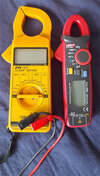I have a very old but reliable Gas boiler. Let's just say it's efficiency is perhaps around the 50% mark.
Now, I was pondering if it was worth switching to an immersion for summer hot water only heating.
But from what I can see, even at 50% efficiency, it is still cheaper than electric.
Gas cost for 1 m3 unit:

Electric cost. 50% of the gas use in kwh:

What surprises me is that, that would mean that current gas tariff, taking into account a 50% efficiency penalty is still cheaper (just) than my pre-april tariff from last year.
I think I have all the tariff prices correct, but I have not included VAT etc. Just raw tariff prices.
Am I correct? Or are my calculations off.
I guess I have to balance against this the extra inefficiency of indirect heating of the tank vs a direct immersion which may heat 50% of a 100l tank. So perhaps a real world test is the best attempt to see what is potentially cheaper.
Now, I was pondering if it was worth switching to an immersion for summer hot water only heating.
But from what I can see, even at 50% efficiency, it is still cheaper than electric.
Gas cost for 1 m3 unit:
Electric cost. 50% of the gas use in kwh:
What surprises me is that, that would mean that current gas tariff, taking into account a 50% efficiency penalty is still cheaper (just) than my pre-april tariff from last year.
I think I have all the tariff prices correct, but I have not included VAT etc. Just raw tariff prices.
Am I correct? Or are my calculations off.
I guess I have to balance against this the extra inefficiency of indirect heating of the tank vs a direct immersion which may heat 50% of a 100l tank. So perhaps a real world test is the best attempt to see what is potentially cheaper.


